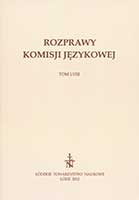Wariantywność gwarowych formacji słowotwórczych na przykładzie nazw osobowych wykonawców czynności
Variantivity of dialectal morhological formations in actor names
Author(s): Renata Marciniak-FiradzaSubject(s): Language and Literature Studies
Published by: Łódzkie Towarzystwo Naukowe
Keywords: dialect; morphology; variantivity
Summary/Abstract: The paper discusses morphological variants of names used to refer to individuals that perform actions (actors), i.e. derivates: 1) that share morphological meaning and semantic function; 2) that are created with the same stem; 3) that are created with different affixes that have the same function, e.g. czyszczacz – czyszczak – czyszczarz ‘ten, kto czyści, tj. kastruje, zwierzęta’ [a person who cleans, i.e. castrates animals]. The paper analyses formations that are more closely related, e.g. chwalus – chwalisz, krzykacz – krzyczek – krzykała – krzykim, as well as formations created with the same stems but having different affixes, e.g. folarz – falownik – folusz – folusznik ‘ten, kto foluje sukno’ [a person who fulls cloth]. In addition to dialectal variantivity, instances of intradialectal variantivity have been identified, e.g. siewca – siewacz – siewak – siewnik – siewarz, as well as idiolectal variantivity, e.g. dójka – dojarka. The complex morphological variantivity of actor names in the dialects of the Małopolska- Mazowsze (Lesser Poland-Mazovia) linguistic borderland is chiefly the effect of the dialects from different regions influencing one another but it is also influenced by the general Polish language. Another factor is the dynamism of cultural and civilisational transformations in the contemporary countryside.
Journal: Rozprawy Komisji Językowej
- Issue Year: 2012
- Issue No: 58
- Page Range: 209-222
- Page Count: 14
- Language: Polish

